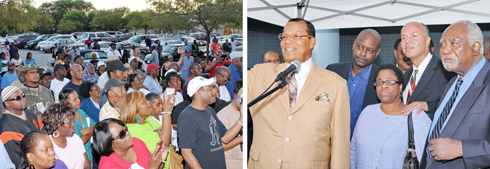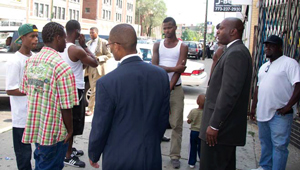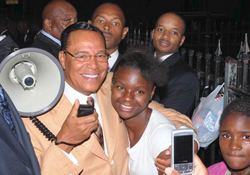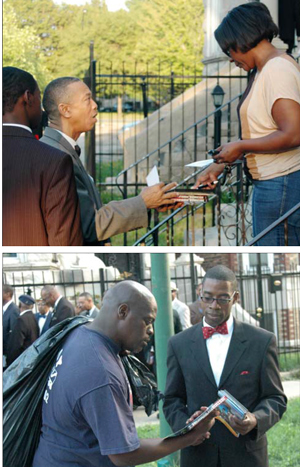-Contributing Writer-

CHICAGO (FinalCall.com) – Violence happens often in poverty-stricken neighborhoods and the city’s West Side is an example of the volatile mix of too little income and too much frustration and hostility.
But on a potentially violent Monday evening, not only did the Honorable Minister Louis Farrakhan talk about peace, but his mere presence and a few words spoken through a bullhorn defused a potentially huge and deadly fight.
Although this North Lawndale neighborhood produced the first Black alderman, the first Black Congressman on the West Side and was a base of Rev. Dr. Martin Luther King, Jr., in his campaigns against poverty and Northern housing discrimination, today it is plagued by gang divisions, petty disagreements and grievances that can escalate very quickly.
On this evening, there was much confusion on 13th St. and Avers, an area “hot spot” for violence.
As the sun went down, tempers went up as a large group of males argued.
There was pushing and shoving and one woman stood screaming as she attempted to stop the violence, explained Robert 27X of the Chicago mosque of the Nation of Islam. Someone shouted seeing a gun; young children and women panicked, running for cover.

But this evening, the Fruit of Islam was present. They walked right into the midst of the altercation and their presence momentarily quelled the violence, but those involved were shouting, visibly angry and not ready to stop.
A few walked away, clearly with intentions to return.
Roughly two minutes later, Min. Farrakhan jumped out of a vehicle and began hugging and taking photos with residents some who were involved in the argument.
Despite the recent tension, young people walked up with smiles, hoping to get a photo with Min. Farrakhan.
The Minister grabbed a bull horn and began speaking to those gathered about the need for self-love which leads to love of others. He urged listeners to end the violence and start the peace. Many smiled, took photos and video with camera phones and cheered.

“Some of the young brothers involved in the fight, as we were leaving, asked us to pray for them,” said Robert 27X.
Prior to that hot stop, Min. Farrakhan stopped on Roosevelt and Homan and was welcomed by elected officials and business leaders. Earlier in the visit, U.S. Representative Danny K. Davis was among those who welcomed Min. Farrakhan to the community. We are here to “introduce our friend … the man of the millennium, all of us will have the opportunity to be inspired by his message of peace, anti-violence and love,” said Rep. Davis.
Min. Farrakhan gave a brief talk to a group of roughly 300 people standing in front of ICE Theater. In November 1997, husband and wife team, Donzell and Alisa Starks, fulfilled a dream and made history by bringing Hollywood back into the Black community in Chicago. “We were too happy to allow him to come to our facility. It’s what we are about. We’re part of the community. And obviously, we need the violence to stop so people feel safe (coming to the movies),” said Alicia Starks, co-owner of ICE Theaters. The theater is celebrating 15 years in business.
Min. Farrakhan spoke of peace, knowledge of self and love of self. “This foray out into hot spots all over the community is wonderful. It’s a message of peace. I think it’s wonderful and we are delighted to have been here with him today,” said Rep. Davis.
“I was impressed with him as usual for his integrity and those men who were on post,” said activist Mark Carter the following day on his Facebook page.
Min. Farrakhan then traveled to a nearby park close to Roosevelt and California where he spoke to young members of a football team and others gathered there. “That’s some good talking. I wish my son was here to hear him, but my son is doing seven months (in jail),” said one woman after listening to Min. Farrakhan.
“We need Min. Farrakhan’s help. Women can’t do it alone. We can talk, but these young men need men to be around and talk to. I hope he comes back,” said another woman.
On several occasions, Min. Farrakhan has made clear his intentions that the Nation of Islam stay in the community to help solve the problems.
Leonard Farrakhan Muhammad, a longtime aide and advisor to the Minister and others, is part of a team helping to build a real program with real solutions.

“The first stage is to build awareness among the people that somebody cares about them and that there’s love for them and they have people that are willing to be strong advocates for elimination of the problems in the community,” said Leonard Muhammad. “As part of phase one, we are doing needs assessment.
Like it was with the Million Man March, we will have local organizing committees throughout the city and throughout the country. We intend on using that template this time around to address the problems in a local kind of way.
We hope what we do here will become a national template, so as we approach the problem and approach the solution to the problem here in Chicago, the same template will be used in over 130 cities throughout America and other cities throughout the world.
We’re also collecting names and addresses and phone numbers of people who we’d like to be participants to the effort and also people who’ll be willing to enroll in what we would consider a life skills or life management program.”
Currently, every city with a population of more than 250,000 reports gang activities and more than half of the homicides reported in Los Angeles, and more than half of the homicides reported in Chicago, are related to gang violence, according to the Office of Juvenile Justice and Delinquency Prevention in the Department of Justice.
Violence, poverty and unemployment go hand in hand. As the overall U.S. unemployment rate stayed at 8.2 percent in June, the rate among Black Americans rose nearly a full percentage point to 14.4 percent from 13.6 percent in May, the Labor Department reported. Since the government started tracking figures in 1972, the Black unemployment rate has been on average roughly double that of Whites.
The economic problem also affects professional, middle-class Black people who have taken a huge hit, especially in the past 10 years, according to a new survey conducted by the Pew Research Center. To be considered middle class, one must be earning roughly $70,000 yearly. But regardless of race, the middle class “has endured a lost decade for economic well-being,” according to Pew Research analysis of data from the U.S. Census Bureau and the Federal Reserve Board of Governors. “Since 2000, the middle class has shrunk in size, fallen backward in income and wealth, and shed some–but by no means all–of its characteristic faith in the future.”
Of those Blacks surveyed, 79 percent said it’s harder now to maintain a middle class lifestyle.
“The job situation is something that’s going to take longer. Ultimately we are going to have to do what the Honorable Elijah Muhammad warned us that we would have to do which is to do for self and to create jobs for ourselves. And without that component, building entrepreneurs and encouraging our people to get busy in this area, then we are not going to have jobs because as we have been taught, America does not have jobs for their own people.
We cannot expect them to offer us jobs first that they need to offer to their own kind. So we need a strong effort to start small businesses in our own community that compete with other communities. When we look at the Asians, Arabs and Latinos, we see a template to copy in order to address this issue,” said Leonard Muhammad.
Related news:
- Love Ye One Another.. Farrakhan, Nation of Islam push message of peace (FCN, 08-23-2012)
- FCN Photos: Nation of Islam, Farrakhan hits the streets in 100+ cities (FCN, 07-25-2012)
- Taking it to the street: F.O.I promote peace nationwide (FCN, 07-25-2012)
- Farrakhan leads peacemaking effort in the streets of Chicago (FCN, 07-25-2012)
- A call to stem crime and violence in the Black community and America’s warmongering (FCN, 07-11-2012)












